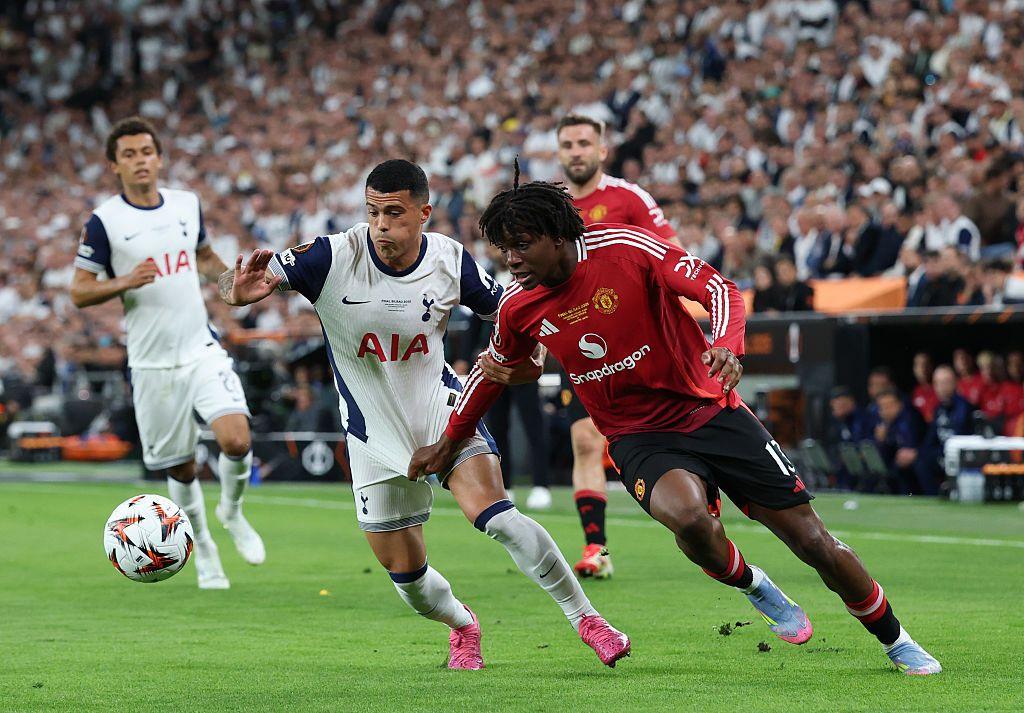What is Uefa's association coefficient ranking?
- Published
Uefa's association coefficient rankings are used to determine which countries have the best-performing clubs in European competitions.
Uefa awards points to both individual teams and their national associations based on their performances across the Champions League, Europa League and Conference League.
Each season, the two highest-ranked nations in each season are awarded an extra place in the following season's Champions League. Meanwhile, the overall five-year rankings determine how many places in each country receives in each competition annually.
For example, England and Spain have earned an extra place in the league phase of this season's Champions League as a result of performances by clubs from those countries last season.
The rankings used for a given season are based on results from the previous year. For instance, for the 25-26 season, the five-year qualifying period from 19-20 to 23-24 is used. However, the two best performing nations from 24-25 season are given those extra spots for the 25-26 Champions League.
A nation's position in Uefa's rankings directly influences how many clubs it can enter into the Champions League, Europa League, and Conference League.
Get in touch
Send us your questions
How do the points work?

Paris St-Germain won the Champions League for the first time at the end of last season
Teams are awarded two points per win and one per draw, although points earned are halved during the qualifying matches.
Points awarded for victories in regular time (90 minutes) and after extra-time are counted, but wins via penalty shootouts do not contribute to Uefa's coefficient rankings
Bonus points are awarded for advancing to specific stages of all three of Uefa's club competitions.
The points earned are then divided by how many clubs competed in European competitions by that nation in that particular season. For the 25-26 season, England's points will be divided by nine as they have nine clubs in European competitions.
Bonus points
Teams between 25th and 36th in Champions League's league phase – six points
Teams between 1st and 24th in Champions League's league phase – six points plus an additional 0.25 for 24th place and increasing by 0.25 for each place above 24th with a maximum of 12 points in total for first place
Teams between 1st and 24th in Europa League's league phase – 0.25 points for 24th and increasing by 0.25 for each place above 24th with a maximum of six points for 1st place
Teams between 9th and 24th in Conference League's league phase - 0.125 points for 24th and increasing by 0.125 for each place above 24th with a maximum of two points for ninth place
Teams between 1st and 8th in Conference League's league phase – 2.25 points for 8th and increasing by 0.25 points for every position above eighth with a maximum of four points for first place
Points for reaching round of 16, quarter-final, semi-final and final in Champions League - 1.5 points per each round reached
Points for reaching round of 16, quarter-final, semi-final and final in Europa League – one point per each round reached
Points for reaching round of 16, quarter-final, semi-final and final in Conference League - 0.5 points per each round reached
Which countries get which spots?

Tottenham, Manchester United and Chelsea reached European finals last season
Russia are currently expelled from playing in European club competitions, meaning the spots they would have been given are distributed elsewhere.
Because Liechtenstein play their league football as part of Switzerland's domestic system, the only Liechtenstein-ran competition is the Liechtenstein Cup which only warrants a qualifying spot in the Conference League.
Champions League
Nations 1-4 – Four league phase spots
Nation 5 – Three league phase spots and one third qualifying round spot
Nation 6 – Two league phase spots and one third qualifying round spot
Nations 7-9 – One league phase spot and one third qualifying round spot
Nation 10 – One league phase spot and one second qualifying round spot
Nations 11-14 – One play-off qualifying round spot and one second qualifying round spot
Nation 15 – Two second qualifying round spots
Nations 16-24 – One second qualifying round spot
Nations 25-55 – One first round qualifying round spot (the two best-ranked clubs from these nations automatically start into the second qualifying round to cover Russia's and Lichtenstein's absences)
Europa League
Nations 1-5 – Two league phase spots
Nations 6-7 – One league phase spots and one second qualifying round spot
Nations 8-12 – One play-off qualifying round spot and one second qualifying round spot
Nations 13-15 – One third qualifying round spot
Nation 16 – One second qualifying round spot
Nations 17-34 – One first qualifying round spot (except for Russia, while the best-ranked club qualifying from a non-top-seven nation is moved straight into the play-off qualifying round)
Conference League
Nations 1-5 – One play-off qualifying round spot
Nations 6-12 – One second qualifying round spot
Nations 13-29 – Two second qualifying round spots
Nations 30-33 – One second qualifying round spot and one first qualifying round spot
Nation 34 – Two first qualifying round spots
Nations 35-47 – One second qualifying round spot and two first qualifying round spots
Nations 48-50 – Three first qualifying round spots
Nations 51-55 – Two first qualifying round spots
How are UK teams currently faring?
England currently holds the top spot in Uefa's association rankings, with English clubs having won five out of 14 major finals across the three European competitions since 2021.
Scotland were ranked 11th for the qualifying period for the 25-26 season but will enter 26-27 in 14th place.
Northern Ireland enter both this season and next season, based on the five-year qualifying period, in 42nd place.
Wales entered this season in 52nd out of 55 nations. They have since dropped to 53rd and could fall to 54th, depending on the performance of Lincoln Red Imps from Gibraltar this season.
This article is the latest from BBC Sport's Ask Me Anything team.
What is Ask Me Anything?
Ask Me Anything is a service dedicated to answering your questions.
We want to reward your time by telling you things you do not know and reminding you of things you do.
The team will find out everything you need to know and be able to call upon a network of contacts including our experts and pundits.
We will be answering your questions from the heart of the BBC Sport newsroom, and going behind the scenes at some of the world's biggest sporting events.
Our coverage will span the BBC Sport website, app, social media and YouTube accounts, plus BBC TV and radio.